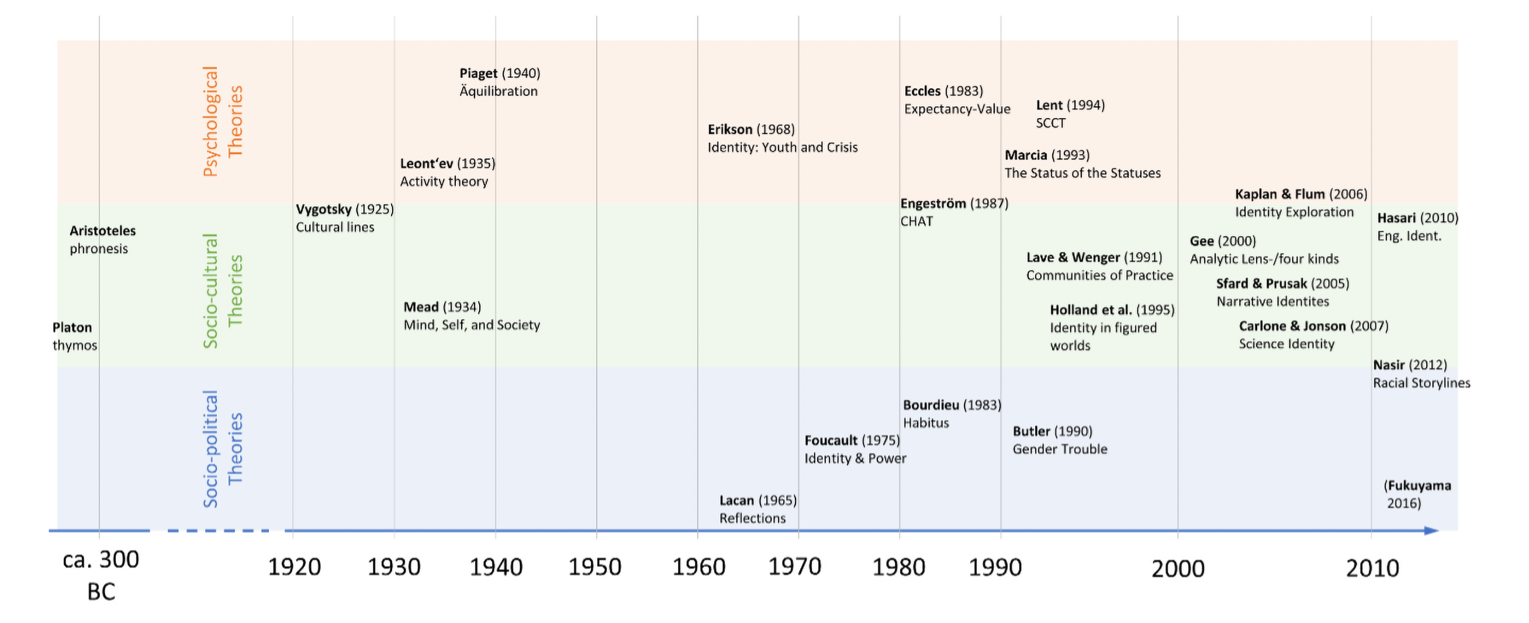An elusive construct
The importance of identity theories in computer science and computer science education
Gregor Große-Bölting
Socially incompetent basement dwellers and nerds: this image of computer science amongst the public, which is supported and nurtured by successful TV series, is incorrect and damaging on many different levels. It reinforces existing prejudices in a discipline already characterized by a lack of diversity. We present how the concept of “identity” is understood in computer science drawing on a comprehensive literature review.

The public perception of computer science makes it even more difficult for people who already find it difficult to identify with the subject. A sense of belonging cannot develop if you don't see yourself as “that kind of person” - i.e. as “nerdy” or “socially inept” - or if you consciously want to distance yourself from it. The increasing examination of identity and theories of identity in computer science education, which has taken place in research in recent years, shows the awareness of these problems in the subject, which are not only inherent in the public presentation, but also in the subject culture itself. Identity research offers a means of focusing on corresponding problems that often have nothing to do with individuals and therefore require a broader focus. Research papers emphasize the versatility of a theoretical tool used to describe identity. This versatility is a great strength on the one hand, but it also represents a great challenge on the other. Navigating the maze of theories with different focuses and orientations can be difficult. As many of the theories do not originate from within the discipline, but have been adopted from psychology, sociology and other subjects, the question arises as to how the multi-layered concept of “identity” is understood in computer science and computer science education: What are the focal points, what theories have been imported from other disciplines and what further and in-house developments exist? These questions were the subject of a systematic literature review, the results of which are presented below. The results are presented below. The historical and conceptual background of identity theories is discussed first.
From Aristotle to the 21st century: The theme of identity
The concept of identity has a long history, beginning with either Plato or Aristotle. The “modern” preoccupation with the term began in the first half of the 20th century. At this time, it was first formulated that the development of an identity during adolescence, i.e. in the teenage years, is of particular importance for learning success. This realization was, in a sense, the big bang for the academic debate on the subject. To provide better orientation, we have developed an overview of the most important theories for computer science education as part of the systematic literature review. We have divided the theories into three different strands: The psychological theories of identity focus particularly strongly on the individual and look at how motivational and cognitive factors influence identification. These theories are often particularly well suited to developing instruments and operationalizations due to their narrower focus. Socio-cultural and socio-political theories, on the other hand, clearly shift the focus away from the individual and towards the social context. While socio-cultural theories look at the immediate environment, the social integration of the individual and factors of tradition and belonging, the focus of socio-political themes is on social factors and aspects of power. All three strands do not overlap and individual theories cannot be assigned to just one strand.
Looking at the identity theories conceptually and not purely in terms of their historical relationship to one another allows them to be better categorized. In mathematics education, two successive and consecutive systematic literature reviews have identified various dimensions that allow such a classification (and which can also be applied outside mathematics education). Various dimensions of the concept of identity were defined, including
- subjective-social,
- representative-active and
- stable-changeable
These dimensions should not be seen as fixed categories, but rather as points of reference. “Subjective” describes identity as a private self-image, while ‘social’ understands identity as a product shaped by social discourses. “Representational” refers to the mediation of identity through language and discourse, while ‘active’ categorizes identity as action and participation in social practices. “Stability” and ‘change’ refer to the question of whether identity is understood as fixed or dynamic. Different concepts of identity can be characterized along these dimensions. Depending on the concept, identity is either presented as stable and subjective-social or as changeable and representational.

Anyone interested in reading up on theories on the subject of identity will find the most important aspects illustrated in the works mentioned here:
Lave, J., & Wenger, E. (1991). Situated learning: Legitimate peripheral participation. Cambridge university press. https://doi.org/10.1017/CBO9780511815355
Wenger, E. (1999). Communities of practice: Learning, meaning, and identity. Cambridge university press.
Radovic, D., Black, L., Williams, J., & Salas, C. E. (2018). Towards conceptual coherence in the research on mathematics learner identity: a systematic review of the literature. Educational Studies in Mathematics, 99(1), 21–42. https://doi.org/10.1007/s10649-018-9819-2Verhoeven, M., Poorthuis, A. M. G., & Volman, M. (2019).
The Role of School in Adolescents’ Identity Development. A Literature Review. Educational Psychology Review, 31(1), 35–63. https://doi.org/10.1007/s10648-018-9457-3
The empirical approach to identity
Identity can also be approached empirically: a systematic literature review was carried out in order to gain an overview of the discussion and use of the term identity and identity theories in computer science. Searches were carried out in the most important databases in the field using two previously defined sequences of search terms, so-called search strings. The resulting articles were evaluated on the basis of predefined criteria and included in a preliminary collection. This resulting initial overview of literature references was then expanded using the so-called forward and backward snowballing method: The references of those articles that have already been found are considered and checked to see whether they have already been found. Using the corresponding functionalities of the literature databases mentioned, it is also checked which other cross-references the articles already contained in the collection contain. These new articles were also checked to see whether they had already been found. The resulting total of 70 scientific journal articles were then read, coded inductively and deductively according to the research questions and existing preliminary work, and the results analyzed.
Identity in computer science: a trending research topic
Empirical evidence clearly supports our assumption that there has been an increasing trend in the study of identity and identity theories in computer science in recent years. The search was not time-limited. The first article dealing with the topic dates back to the late 1990s. Nevertheless, more than half of the articles were published after 2018.
Looking at the articles to see what reasons are given for dealing with the topic of identity, the authors cite diversity as the main reason, closely followed by retention, i.e. learners remaining in the subject. In contrast, the remaining reasons were cited much less frequently. Unsurprisingly, retention plays a greater role in the university context, while diversity is frequently mentioned in both areas.
Looking at how identity is used, we see that the term is used to describe social phenomena more precisely. Identity effectively plays the role of an adjustable lens for research in computer science didactics in order to focus on the interaction of individuals with the subject and the social group on different levels: Theory can be used - especially paired with psychological theories - to focus on individuals and their learning progress in the subject. However, it can also (especially with socio-cultural and socio-political theories) focus on systemic problems and provide information on how learning success is influenced by the subject culture. In contrast, theory is used less frequently to develop and evaluate interventions or even instruments. Only few articles dedicated to these tasks could be identified for these areas; there is still a large research gap here. The results also revealed the conflict within identity theory that has already been alluded to: Its particular strength is that it can explain social phenomena. The more one leaves the level of the individual in the analysis, however, the more difficult it becomes to isolate the effects to be examined, which is a necessary prerequisite for the development and evaluation of effective interventions and valid instruments. It is therefore hardly surprising that the majority of the articles examined use qualitative research approaches, while quantitative methods only play a subordinate role in identity research in computer science education.
Conclusion
Identity research poses a major challenge for academics due to its diversity: It is often unclear how individual theories relate to each other, what function they fulfill and what is special about them (compared to other theories). Moreover, shouldn't it be possible to create a definition based on clear criteria that clearly describes what identity is in computer science and what constitutes it for computer scientists? The systematic literature review we conducted shows that such an endeavor is not easy: people are not shaped by a single identity, but by a multitude of interrelated and conflicting identities. Moreover, each identity theory has a different focus and is a tool in itself, designed for a specific purpose. Therefore, psychological and socio-cultural or socio-political theories do not contradict each other, at best they complement each other.

About the author:
Dr. Gregor Große-Bölting studied philosophy and computer science at Kiel University (CAU) and the FernUniversität in Hagen. He is a researcher in the Computer Science Education working group at the IPN and the CAU. In addition to teaching in the areas of digital humanities and ethics in computer science, he deals with different perspectives on the subject of computer science and how these affect learners (especially at university). The results presented here are part of his dissertation. ggb@informatik.uni-kiel.de
Further literature:

Große-Bölting, G., Gerstenberger, D., Gildehaus, L., Mühling, A., & Schulte, C. (2021). Identity in K-12 Computer Education Research: A Systematic Literature Review. Proceedings of the 2021 ACM Conference on International Computing Education Research. https://doi.org/10.1145/3446871.3469757
Große-Bölting, G., Gerstenberger, D., Gildehaus, L., Mühling, A., & Schulte, C. (2023). Identity in Higher Computer Education Research: A Systematic Literature Review. ACM Trans. Comput. Educ. https://doi.org/10.1145/3606707
Große-Bölting, G. (2023). Conceptions, Identity, Values and Practices: Didactic Perspectives on Computer Science. https://nbn-resolving.org/urn:nbn:de:gbv:8:3-2024-00158-4









